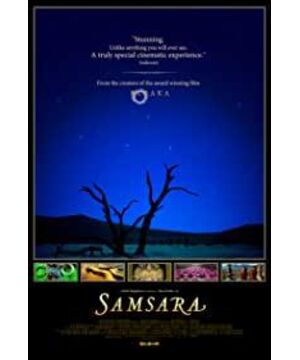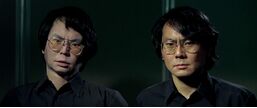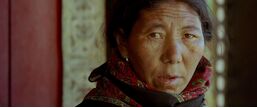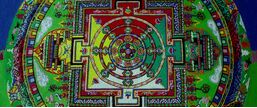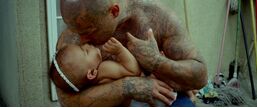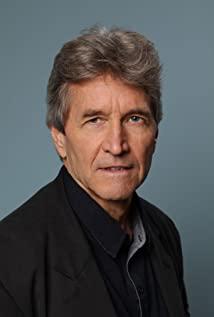It is a documentary filmed in the United States a few years ago. It took a full five years to shoot, and the footprints have spread across five continents. No dialogue, no commentary, only slow music accompanied. Endless meaning, all in silence.
Look at the name, it's like a Buddhist language. I just watched "Kang Rinpoche" and I felt connected, so I started watching it. It wasn't until I watched it all that I realized that the title of the film does not exactly mean the meaning of "reincarnation" in Buddhism. Rather, it contains a broader and more ambitious content. The director is asking a question to the audience, to humans, and to himself: "Who am I? Where do I come from? Where do I go? How do I live? How do humans live? How does nature live?"
At the beginning of the film, several common religions are shown: Buddhism, Christianity and Islam. As well as some sacrificial methods of early human civilization, Greek temples and sculptures, as well as Egyptian pharaoh mummies, worshippers.
Then there are the spectacular scenery on our earth, with majestic mountains and rivers, craggy peaks and rocks, calm waters, rushing waters, stalwart towering trees, weird old branches, churning clouds, and roaring volcanoes.
The film gradually entered human society. From the primitive tribes in Africa to the modern production lines, even from the pictures, we can feel the harmony between human beings and nature and the intensifying conflict.
At the end of the film, it returns to the scene at the beginning. The Gothic church, the dome of the monastery, and the sound of religious prayers are endless, which seems to be pinning people's last piety and hope.
In the rational world, it is empirical evidence that is honored. All verified things are real. What has been confirmed by the experience of most people is also true. It follows, therefore, that reason does not admit that which is merely felt but unverified. So the question arises: Does reincarnation exist? Does a creator exist?
I believe in communism. It is always believed that a communist society is the best society that human beings can dream of. (Of course, the road to communism is still being explored). Also believe in atheism. Never thought that God or Allah existed. But in addition to the belief in social and political laws, there is still a belief in the existence of a creator. Maybe he doesn't have the shape of a human, nor does he appear in any identifiable form in nature today, he is not Allah, not God, not Sakyamuni, not Jade Emperor, not God. So what to call him? Can't be called God. Let's just call it an objective law. This idea is very close to Deism. Many people, including Einstein, believed it.
According to objective laws, sunrise and sunset, tides ebb and flow, trees grow high, water flows low, the development of all things in nature, and the emergence of human beings. But I believe that this law also includes reincarnation. Perhaps people's initial understanding of reincarnation is the law of negation of negation?
Humans have existed for tens of thousands of years, while the development of rationality and the emergence of modern natural science are only a few hundred years away. Hundreds of years of thinking should not negate the tens of thousands of years of human experience and feeling. Our understanding of human beings and the natural world is still at a very early stage. What rationality and science can prove is good, but what cannot be proved does not mean it does not exist. Human beings live in ignorance most of the time, but they are still developing and progressing slowly, which shows that human experience and feeling are constantly tending towards objective laws and in the right direction. These feelings include belief in the Creator and recognition of reincarnation. Perhaps it was just ignorance that led them to try to personify the Creator.
The film shows the development scene of modern society. In a modern slaughterhouse, countless pigs are slaughtered and divided. Immediately followed by the scene is that countless people in and out of the supermarket, waiting for the slaughter of the merchants. In another set of shots, people produced lifelike robots, very realistic. We immediately saw the Japanese geisha wearing eyebrows and makeup, with a pale face and lifeless. So are machines imitating humans, or are humans becoming machines?
There is no doubt that the rapid development of human society is inevitably heading for a predicament and going astray. However, the vicious circle caught in it is: Isn't this anti-natural trend of mankind a kind of law and necessity?
As the saying goes: to make it perish, first make it crazy. Look at it now, the endless wars, the endless scramble for power, the endless amassing of money. Endless request for nature's resources. It got to the point of madness. Maybe the creator thought the same way: "You humans are messing around, you just make trouble, and one day you will suffer." Maybe this day is the end of the old cycle and the beginning of a new one. In my opinion, there are only three ways, one is the invasion of external forces, the other is the self-destruction of human beings, and the other is the consciousness of human beings themselves. Either way, there will be a painful process.
So I envy the believers of those religions, indulging in their own beliefs, silently preparing to accept the reincarnation that will come sooner or later. Xiaozhou has since passed away, and the rest of his life will be sent to Jianghai. Good.
View more about Samsara reviews


